Notes 2 PDF

| Title | Notes 2 |
|---|---|
| Author | Mindy Osler |
| Course | Introductory Consumer Economic |
| Institution | University of Georgia |
| Pages | 17 |
| File Size | 221.6 KB |
| File Type | |
| Total Downloads | 82 |
| Total Views | 140 |
Summary
Lecture notes for module 2...
Description
Purpose of College ● Half of Americans (50%) say that the main purpose of college should be to teach specific skills and knowledge that can be used in the workplace ● 35% think its main purpose should be to help students grow and develop personally and intellectually ● 13% think that these objectives are equally important ○ For instance, 56% of Americans with a high school diploma or less say college should be primarily a place to develop specific work-oriented knowledge and skills, while 31% see it primarily as a place for personal and intellectual growth Graduates View of Purpose ● When asked to assess certain aspects of their own educational experience, about 6/10 (62%) college graduates (including those who graduated from a two-year degree program) feel that their time in college was very useful in helping them grow personally and intellectually ● About half say their college experience was very useful in helping them access job opportunities (53%) or in helping them develop skills and knowledge they could use in the workplace (49%) Purpose According to Those with Masters or PHD or More ● Americans who have engaged in additional schooling beyond a bachelor’s degree are especially likely to say that the main purpose of college should be personal and intellectual growth, rather than the acquisition of specific skills and knowledge ● Some 47% of those with a postgraduate or professional degree think the main purpose of college should be personal and intellectual growth ● While 35% think it should be teaching workplace-relevant skills Purpose: Democrat vs. Republican View ● Democrats (including Democratic-learning independents) are about evenly split on which of these objectives is more important: ○ 42% say colleges should prioritize personal and intellectual growth ○ 43% say they should prioritize the development of workforce-relevant skills ● But among Republicans and Republican learners: ○ 58% say that the main purpose of college should be teach specific skills ○ 28% feel that the main purpose should be general personal and intellectual growth Degree Usefulness ● Roughly 6/10 (62%) college graduates with two- or four- year degrees think their degree was very useful for helping them grow personally and intellectually ● While roughly half think it was very useful for opening up job opportunities (53%) ● Or for providing them with useful job-related skills and knowledge (49%) Good Paying Job Preparation ● Just 16% of Americans think that a four-year degree prepares students very well for a well-paying job in today’s economy ○ 51% say this type of degree prepares students “somewhat well” for the workplace ● Some 12% think that a two-year associate degree prepares students very well
○ 46% says somewhat well 26% feel that certification programs in a professional, technical, or vocational field prepares students very well ○ 52% says somewhat well View of Certificate Programs ● A substantial larger share of the public has positive attitudes towards certification programs in a professional, technical, or vocational field in the context of workforce development ● Some 78% of Americans think that these programs prepare students well for a job in today’s economy ○ Including 26% who think they prepare students very well Credentials Gap ● Recent research has argued that there is a “credentials gap” in today’s workforce, as employers increasingly require a bachelor’s degree for positions that did not demand this level of schooling in the past ● And the survey finds that 33% - 34% of Americans who do not have a four-year college degree report that they have declined to apply for a job they felt they were qualified for because it required a bachelor’s degree Did Not Apply for Job Because of Education Requirements ● Some 25% of Americans with a high school diploma or less and no additional schooling beyond that have NOT applied for a job because of a bachelor’s degree requirement ○ But that figure rises to 34% among those with a high school diploma plus additional vocational schooling ○ To 38% among those with some college experience but no degree ○ And to 44% among those with a two-year associate degree Racially Driven Responses ● Black and Hispanics are more likely than whites to say four- and two- year degrees prepare people very well for a job in today’s economy ○ For example about 3-in-10 (29%) Hispanics and about a quarter (24%) of blacks say this about a four-year degree, compared with 12% of whites ● These findings are consistent with previous Pew Research Center surveys that found that black and Latino parents view college as more essential for their children’s success than do white parents This Research Demonstrates That: ● In spite of the potential benefits and opportunities available to college graduates - and the potential challenges faced by those who lack a college diploma - Americans have somewhat mixed attitudes about the effectiveness of traditional four-year colleges and other higher education institutions Arguments for College ● College graduates make more money ○ On average, a college graduate with a bachelor’s degree earned $30,000 more per year than a high school graduate, or about $1,400,000 more over a lifetime ● More and more jobs require degrees ●
○ Approximately 63% of jobs will require some college education or a degree Colleges allow students to explore career options ○ 80% of college students complete internships before graduation, giving them valuable employment experience before entering the job market ● College education has a high return as an investment ○ Return of 12-15% per year as an investment, larger than the stock market ○ 86% of college graduates believe college was a good investment ● College exposes students to diverse people and ideas ○ The community of people on a college campus means students are likely to make diverse friends and business connections, and potentially, find a spouse or mate Arguments Against College ● Student loan debt often forces college graduates to live with their parents and delay marriage, financial independence, and other adult milestones ○ In 2013, student loan borrowers delayed retirement saving (41%), car purchases (40%), home purchases (29%), and marriage (15%) ○ Less than 50% of women and 30% of men passed the “transition to adulthood” milestones by age 30 ○ In 1960, 77% of women and 65% of men completed these milestones by age 30 ● Many recent college graduates are ‘un’ or ‘under’ employed ○ The unemployment rate for recent college graduates was 8.8% in February 2013, down from 10.4% in 2010, but up from 5.7% in 2007 ■ The great recession had a HUGE impact here … middle management / educated jobs were lost ○ According to the Federal Reserve Bank of New York, 44% of recent college graduates were underemployed in 2012 ● Many people succeed without college degrees ○ According to the Bureau of Labor Statistics, of the 30 projected fastest growing jobs between 2010 and 2020, five do not require a high school diploma, nine require a high school diploma, four require an associate’s degree, six require a bachelor’s degree, and six require graduate degrees ● Tuition has risen quicker than income, making it difficult for the average American to pay for college without incurring debt ○ The average tuition and fees at an in-state public college is 73% less than the average sticker price at a private college, at $9,716 for the 2018-2019 year compared with $35,676 respectively ● The total cost of going to college also includes the cost of missing opportunities to make money at a job ○ The total cost of going to college means more than tuition, fees, and books; it also includes an opportunity cost which equals at least four years of missed wages and advancements from a full-time job In Spite of Cost, is College Worth it? ●
●
Having a degree - especially in a tough economic environment - certainly makes a different to employment and lifetime earnings prospects, experts say ● Research from the Bureau of Labor Statistics shows a high correlation between joblessness and earnings, and those with less an associate’s degree fare worse on average than workers with post-graduate credentials ● However, a recent survey of more than 30,000 college graduates across the country arrived a common conclusion: the name of a college or university has little to no influence on a graduate’s job prospects ○ Neither does the “college” within the university; meaning that, graduating from FACS, or Franklin carries the same market weight as a Terry College Degree The Value of a College Degree ● Bachelor’s degree holders earn on average 84% more than high school graduates ● This adds up to about $1.4 million over a lifetime Is a College Degree Really Necessary? ● No matter where a person starts, going to college increases the chances of moving up the economic ladder: ○ Graduates from the bottom 20% are over six times as likely to reach the top than those who don’t go to college ○ The impact is also striking for those born into the second lowest 20%; their chances of getting to the top are 5x higher with a college degree ● A college degree assists consumers in moving from the lower income quintiles into the higher income quintiles… which is good because not everyone is born to wealthy parents… sometimes you have to climb the ladder on your own The Value of a College Education ● A college degree also has many non-monetary benefits that lead to a higher quality life ○ Longer life expectancy and better health ■ Women with college degrees live on average 4 years longer than women with high school degrees ○ Greater participation in community and volunteer activities ■ College grads are active in their communities 50% more than those with only a high school degree ○ Better academic performance for college graduates’ children ■ Children of college grads score higher on national tests of math, reading, and writing skills ○ Greater awareness of current events and government ■ College graduates are more likely to read the newspaper at least once a week ○ Much greater participation in arts and leisure activities ■ College grads are more than 50% more likely to go to the movies at least once per year Investing in Education
●
If we look at a college degree as an investment, we see it has a greater return than the stock market ○ Annual net return on college - 12-15% per year, over and above inflation ○ Annual net return on stocks - 7% per year, on average Education and Careers ● In times of rapid technological progress (like now!), workers with critical thinking skills adapt to innovations far better than those without such skills ○ In college, you’ll develop the critical thinking and continuous learning skills required in the modern workplace ○ Plus, college graduates have lower unemployment, steadier employment, and much better opportunities for advancing their careers Correlation Between Education, Earnings, and Unemployment ● College graduates have more and better employment opportunities ● College graduates are more likely to have health insurance and retirement plans ○ 70% of college graduates had access to employer provided health insurance compared to 50% of high school graduates in 2008 during the Great Recession Lifetime Value ● Careers that require a college degree are far more likely to have benefits such as health insurance, retirement plans, and paid vacations ○ Adding these to salary, it is easy to imagine a college degree worth several million dollars over your lifetime ● A standard health plan costs more than a $1,168 /month for a family of 4; an employer provided plan usually costs a small fraction of this, saving as much as $10,000 per year ○ Over 25 years, this saves $250,000 ● A college grad with the normal salary progression contributing 5% of their income a year into a pension plan with an employer match will accumulate $849,000 by age 62 at the average growth rate for stocks ● A high school grad who contributes 5% of their income without an employer match accumulate $171,000 by age 62 ● Attending classes diligently and alertly is a key to college success, no matter how boring your professor may be ○ You should spend 15 hours per week in a classroom for 30 weeks each of your 4 years at UGA leading to a degree ● Studying = $555/hour ○ Studying an average of three hours per credit per week instead of one hour is quite often the difference between passing and failing ○ The extra hours studying can be worth $555 prorated per extra hour ■ Meaning…. Those hours of study equate to you potentially earning that much more during your lifetime The College Experience ● Before hitting the snooze button and skipping class, consider the value of that class to you
○
Before deciding to replace three hours of studying with three hours of partying, consider the value of those study hours to you ● Think about it this way… you may need brain surgery someday… do you want your doctor to have been one of those “skip class” kinda students?? ○ What if the doctor skipped on the day s/he was to learn how to put your brain back together?? ● Before agreeing to work an extra 10 hours per week for extra spending money and replacing 10 hours of studying, compare the hourly pay of the job with the lifetime value of studying ○ $8 / hour x 10 hours = $80 OR ○ $555 / hour x 10 hours = $5,550 The Economic Value of a College Degree ● $1.4 million … and more Facts Matter ● A college degree is the surest way to increase wage potential ● A college degree, given the rise of artificial intelligence, is the best way to prepare for an uncertain future ● A college degree, given employers’ demands for employees who are multi-talented and who are flexible critical thinkers in the workplace, is the best way to obtain and sustain one’s employment ○ This I can tell you for certain… we host a “FHCE students only” career fair in the spring and overwhelmingly the invited employers want students who are deep critical thinkers who are open-minded and willing to learn and/or teach one another on the job Center on Education and the Workforce @ Georgetown University ● People who earn a bachelor’s degree and work full time can expect to earn 84% more than those with just a high school diploma over the same number of years in their lifetimes The Chronicle of Higher Education ● Estimates the earning gap to be more than $32,000 per year ○ Resulting in a lifetime total difference of nearly $1.4 million ● College graduates also receive increased employer-provided fringe benefits such as health insurance, retirement plans that result in better health and longer life expectancy ● Graduates with BS degree pay $563,000 more in taxes; thus, the educational benefits also benefit the economy as a whole Research: Bain and Company, INC. ● In a 2018 report, examined how automation and artificial intelligence (AI) are changing the landscape of market work ● The rapid spread of automation may eliminate as many as 20%-25% of current jobs - the equivalent of 40 million displaced workers
○
However the benefits of automation will likely flow to about 20% of workers primarily highly compensated, highly skilled workers - as well as the owners of the automation ● Furthermore, the demand for workers to build the automation tools is already growing not only in fields such as engineering and software development Technology and Education ● Technology companies will need highly skilled workers trained in Science, Technology, Engineering, Math (STEM) fields, as well as communications, business, humanities, and economics… fields that can market products, recruit potential investors, interact with client and the media ○ And aren’t you lucky… the FHCE department has BS/MS/PHD degrees to cover all of these needs: ■ Consumer economics, consumer analytics, consumer journalism Review of Educational Research ● 2016 study found that critical thinking skills and dispositions improve substantially over a normal college experience ○ Meaning, learning to put up with your college roommate; attending classes when you really don’t want to; figuring out how to be the leader for group projects… and all of those other annoying activities in which you must engage as past of your college experience do have benefits ■ We wouldn’t assign them if they didn’t; you do realize that group projects are much more challenging for the faculty members as well… we do it for you! New York Federal Reserve ● 2014 study confirmed that college instills in students aptitudes, skills, and other characteristics that make them different from those who do not go to college ● Which isn’t to say that those who do not go to college do not have aptitudes or skills… it's just that they are different Old People ● It is most likely that you will be employed in more positions during and for the the first three years after graduating college than your grandparent (most likely grandfather) had during his whole lifetime The College Experience ● Likely consists of classes, experiential learning opportunities, internships, research opportunities, and interpersonal interactions that prepare one for a diverse working world ● Some of these “soft skills” are typically skills for which there is no objective measurement ○ Meaning we can’t measure / quantify what you learned by interacting with the “free-riding” student… you know, the kid who doesn’t expect to work during a group project and then complains when s/he doesn’t get the same grade as the leader of the group does ■ If you think those folks disappear in the work force you are kidding yourself…. Some of them become bosses!!! And you have to know how to deal with them…
The Future and Education ● The world is changing rapidly…. ● Consumers must prepare themselves, through various forms of education, for what is to come ● A college education is the strongest proven path toward financial stability, job retention, and career malleability Buckminister’s Knowledge Doubling Curve ● 1900: knowledge doubling every century ● 1945: knowledge doubling every 25 years ● 1982: knowledge doubling every 12-13 months ● 2020: IBM predicts knowledge every 11-12 hours ○ Think about this… what big data sources are collecting information on your behavior right now? ■ Facebook, snapchat, kroger card, insurance form, doctor’s offices, debit card, credit card, closed circuit cameras, etc.
● What is Causing This? ● If knowledge were increasing at the same rate over time, handling it all would still be challenging, but the exponential growth of knowledge makes it all much, much harder ● What’s causing this knowledge explosion? Here are the 4 top reasons: Reason 1 ● The internet of things ○ Estimates run as high as 50 billion interconnected devices by 2020
○
Soon the amount of information generated by connected devices will likely match, if not outstrip, the amount of information generated by people
Reason 2 ● Big data ○ Security and privacy issues notwithstanding, our increasing sophistication and ability to gather and analyze so much information is already providing new knowledge and insights that are increasingly helpful for decision-making ○ Without modern data analytics, and the advanced computing technology that powers it, a treasure trove of valuable information would go undiscovered Reason 3 ● Advancement of science and invention ○ Scientific discoveries and new inventions proceed at a blistering pace ■ According to the US Patent Office, over the last 50 years, the number of annual patents increased from about 50,000 to more than 325,000 ○ Some new scientific discoveries and modern inventions replace older ideas, but, more often these new discoveries and inventions are additive ○ Charles Duell, commissioner of the US Patent Office in 1899, famously remarked, “everything that can be invented has been invented” - Boy, was he wrong! Reason 4 ● The collaborative, knowledge-sharing society ○ The growing interconnectedness of individuals, teams, and organizations creates great opportunities for knowledge to be discovered, distributed widely, and enhanced by groups of people who, in the past, might have worked independently and perhaps been left in the dark ■ Indeed, much of today’s new knowledge is developed and disseminated by collaborating teams rather than individuals Manag...
Similar Free PDFs

MNB1501-Notes-2 - NOTES
- 24 Pages
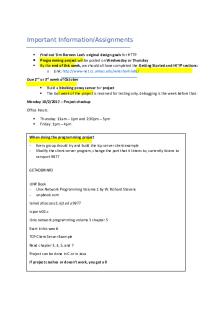
2 - Lecture notes 2
- 5 Pages

Notes 2
- 6 Pages

Notes 2
- 17 Pages

2 - notes
- 11 Pages

Notes 2
- 3 Pages

2 Biodiversity - Lecture notes 2
- 33 Pages
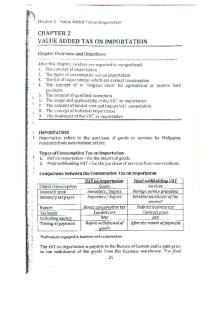
Chapter 2 - Lecture notes 2
- 30 Pages
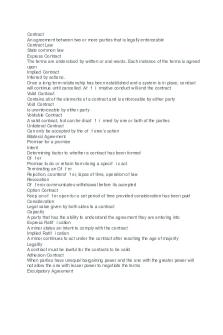
Blaw 2 - Lecture notes 2
- 4 Pages
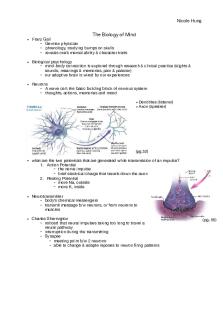
Chapter 2 - Lecture notes 2
- 4 Pages
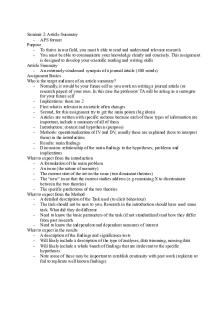
Seminar 2 - Lecture notes 2
- 2 Pages
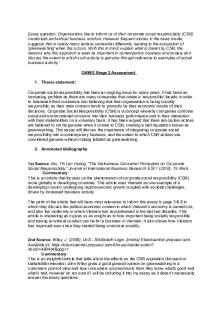
Stage 2 - Lecture notes 2
- 3 Pages

Micro 2 - Lecture notes 2
- 18 Pages

2 Sources - Lecture notes 2
- 4 Pages

Prof 2 - Lecture notes 2
- 3 Pages
Popular Institutions
- Tinajero National High School - Annex
- Politeknik Caltex Riau
- Yokohama City University
- SGT University
- University of Al-Qadisiyah
- Divine Word College of Vigan
- Techniek College Rotterdam
- Universidade de Santiago
- Universiti Teknologi MARA Cawangan Johor Kampus Pasir Gudang
- Poltekkes Kemenkes Yogyakarta
- Baguio City National High School
- Colegio san marcos
- preparatoria uno
- Centro de Bachillerato Tecnológico Industrial y de Servicios No. 107
- Dalian Maritime University
- Quang Trung Secondary School
- Colegio Tecnológico en Informática
- Corporación Regional de Educación Superior
- Grupo CEDVA
- Dar Al Uloom University
- Centro de Estudios Preuniversitarios de la Universidad Nacional de Ingeniería
- 上智大学
- Aakash International School, Nuna Majara
- San Felipe Neri Catholic School
- Kang Chiao International School - New Taipei City
- Misamis Occidental National High School
- Institución Educativa Escuela Normal Juan Ladrilleros
- Kolehiyo ng Pantukan
- Batanes State College
- Instituto Continental
- Sekolah Menengah Kejuruan Kesehatan Kaltara (Tarakan)
- Colegio de La Inmaculada Concepcion - Cebu
